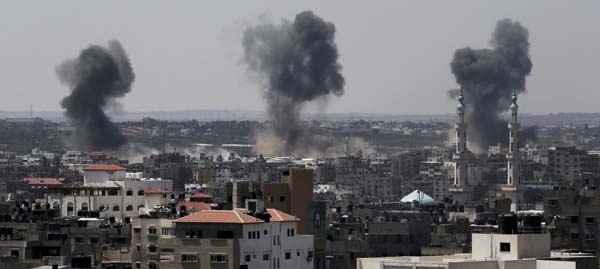As Israel continues tightening its grasp around the neck of Gaza residents, the world watches over the incident without any effective plan on the ground in order to put an end the tragedy. Israeli forces pounded Gaza on Wednesday, meeting stiff resistance from Hamas Islamists and sending thousands of residents fleeing, as US Secretary of State John Kerry said on a visit to Israel ceasefire talks had made some progress.
Israel launched its offensive on July 8 to halt missile salvoes by Hamas and its allies, struggling under the weight of an Israeli-Egyptian economic blockade and angered by a crackdown on their supporters in the nearby occupied West Bank. After failing to halt the militant barrage through days of aerial bombardment, Israel sent ground troops into the Gaza Strip last Thursday, looking to knock out Hamas’s missile stores and destroy a vast, underground network of tunnels.“We are meeting resistance around the tunnels ... they are constantly trying to attack us around and in the tunnels. That is the trend,” Israeli military spokesman Lieutenant-Colonel Peter Lerner said on Wednesday.
Gaza’s Health Ministry said 18 Palestinians were killed on Wednesday, many of them in the southern town of Khan Younis — one of the focal points of Israel’s recent assault.In the far north, residents continued to flee BeitHanoun as Israeli tanks thrust deeper into the border town and destroyed nearby orchards in their search for hidden Hamas tunnels.Gaza officials said that so far in the 16-day conflict, 475 houses had been totally destroyed by Israeli fire and 2,644 partially damaged. Some 46 schools, 56 mosques and seven hospitals had also suffered varying degrees of destruction.
The Israel latest maniacal rampage in Gaza has unfolded not just against the background of the abortive US-led peace talks but also of an egregious outpouring of Zionist self-congratulation.As the ‘Arab Spring’ gave way to baleful developments across much of the Middle East, Zionist commentators indulged in an orgy of gloating. Their barely disguised racist message to the West was: ‘Now you see what our neighbours are really like. How did anybody ever imagine that solving the Palestine-Israel conflict was the key to bringing peace and stability to the wider region?’
Some critics of the Jewish state have always maintained that to see the Arab world plunged in internecine conflict was the cherished goal of the Zionist establishment. Their belief is that ideologues in Tel Aviv and Washington lobbied hard for the 2003 invasion of Iraq with precisely this objective in mind. However this may be, the current disarray of the Middle East is plainly not altogether displeasing to the sort of smug, myopic Zionists who boast that Israel is the ‘villa in the jungle’.
If Western media reaction to the current Gaza offensive has been muted, it is partly because this self-serving Zionist narrative chimes with public fatigue, a prevailing reluctance to think about foreign affairs. Certainly there is a growing Western conviction following the debacles of the interventions in Afghanistan and Iraq that the problems of the Arab and Muslim worlds defy understanding, let alone solution. At the same time, the news media are palpably struggling to muster the resources to cover a geopolitical scene seething with crisis to an extent not seen in many decades.
Concerning Gaza, you could be forgiven for thinking that the London-based media have been only too ready to reflect the present isolationist mood — thereby also gratifying sentiment. On the weekend of July 12, 2014, with Palestinian casualties escalating rapidly, the front page of the Guardian newspaper was devoid of any reference to Gaza – though of course there was coverage inside. Meanwhile, BBC news bulletins were leading with former Archbishop of Canterbury George Carey’s endorsement of ‘assisted dying’. Whether terminally ill Britons should enjoy the right to die was apparently more newsworthy than the plight of Gazan children who were being robbed of the right to live.
Even when the Palestine-Israel conflict is discussed on the BBC, it is often in terms as stale as they are discredited. In a radio discussion with the American diplomat, Dennis Ross, the veteran BBC broadcaster, John Humphrys, remarked that everybody acknowledges that in the end there is no alternative to a ‘two state solution’. Humphrys spoke as if unaware that even among inveterate supporters of the ‘two state solution’ there are now grave doubts, thanks to endless illegal settlement-building by Israel in the West Bank, as to its viability.
Though the BBC may be more culpable than most, the mainstream media in the UK and US operate as though the debate about Palestine-Israel raging in alternative Anglophone media is not happening. Last week, in an online polemic, the American Jewish peace activist and writer, Jeff Halper, made a compelling case that Israel’s agenda in Gaza is to communicate to all its inhabitants, not just Hamas, the stark message: ‘submit, leave, or die’. His verdict was echoed by the heroically heretical Israeli columnist Gideon Levy. It is indefensible that these distinguished commentators – whose opinions are informed by years of observation and reflection – are shunned by leading print and broadcast media.
The cynical Zionist calculation is perhaps that so long as such voices seldom reach the wider public they are effectively irrelevant. Yet albeit imperceptibly, the denial of access by the BBC and other news organisations to the likes of Jeff Halper is compromising their credibility. Increasingly, politically engaged persons resort to new online forums of debate, while millions more, jaded about the Middle East though they may be, behold the latest grisly images from Gaza and form their own views about the legitimacy of Israel’s actions.

